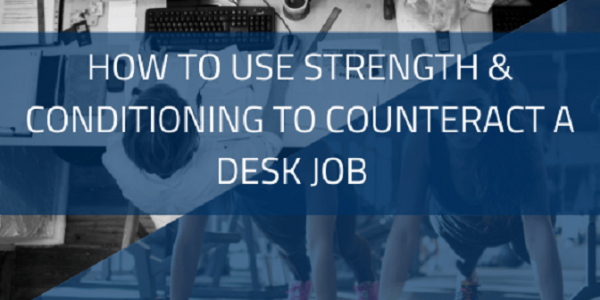For most people when they think of strength and conditioning, images of coaches training elite athletes spring to mind and whilst this is often the case, here at Strength and Conditioning Education we believe a good strength and conditioning programme can benefit everyone, from elite athletes to office workers with their daily desk jobs.
Recent studies have made some huge claims when it comes to our office jobs. Research by the NHS has found that the average person in the UK is physically inactive for seven hours a day, increasing with age to 10 hours or more. Hours of inactivity include working a desk job, commuting, reading and watching television, it does not include hours slept.
You don’t need us to tell you exercise is good for you, specifically, we’re here to help you and your clients understand how solid foundations in strength and conditioning can help improve the wellbeing of those who are forced to live predominantly sedentary lifestyles.
The effects of a desk job
If we continue at the rate we’re going a news report titled ‘The Work Colleague Of The Future’ highlights the health implications we may get from spending days at our workstations. A permanently hunched back from sitting at a desk, varicose veins from poor blood flow and red eyes from long hours looking at a laptop. In fact, 50% of the workers interviewed for the study already suffered from sore eyes, with 49% also claiming sore backs and 48% headaches, nevermind the weight gain.
It’s not all doom and gloom though, so don’t go throwing in your resignation just yet…Research published on The Lancer says:
“High levels of moderate-intensity physical activity (ie, about 60–75 min per day) seem to eliminate the increased risk of death associated with high sitting time. However, this high activity level attenuates, but does not eliminate the increased risk associated with high TV-viewing time. These results provide further evidence on the benefits of physical activity, particularly in societies where increasing numbers of people have to sit for long hours for work and may also inform future public health recommendations.”
How can strength and conditioning help?
With a Strength and Conditioning Coach you get the additional movement analysis and expertise your average PT might not have. On our Level 4 Strength and Conditioning course we particularly focus on demonstrating exercises to improve mobility in common imbalances and a good coach will be able to actively work with their client to improve imbalances and work on good movement mechanics, whether it’s for an athlete in sport or Joe Blogs who wants to develop strength to combat the negative effects of their office job.
This is where strength and conditioning come into play. By developing strength the average desk worker engages muscles they haven’t previously engaged, improves their posture, and targets some of the health risks associated with prolonged periods of sitting.
A huge part of any strength and conditioning programme is developing training methods that enable the client to stay injury-free. Our sedentary lifestyles with long seated commutes to hours behind a desk can make us more prone to injury due to muscular tightness from poor posture, inability to engage muscles correctly, tightness from sitting and repetitive strain.
Exercises you can perform to help
Whilst you might not be able to grab an Olympic bar at your desk, we do have 5 key mobility exercises which will help keep you mobilised. These are really simple examples that can be done anytime anywhere. Of course, there are a multitude of different exercise and ways you can develop strength & conditoning to combat a sedentary lifestyle, but these are very simple to get you started.
These simple but effective movements can be completed daily to enhance mobility.
Lateral Lunges
Quad Reverse Lean
Stiff-Legged Walks
Scapula Push Up
Toe Touch Squat With Reach
These basic mobility exercises merely scratch the surface of what a good strength and conditioning programme can do for your strength, posture, mobility, performance, and overall health, but they are a great starting point for someone who is concerned about their mobility due to straining over a desk or similar.
To find out more about strength and conditioning and how it can benefit you or your clients, try this article which asks, what is strength and conditioning?
Download our Strength and Conditioning Courses Brochure
